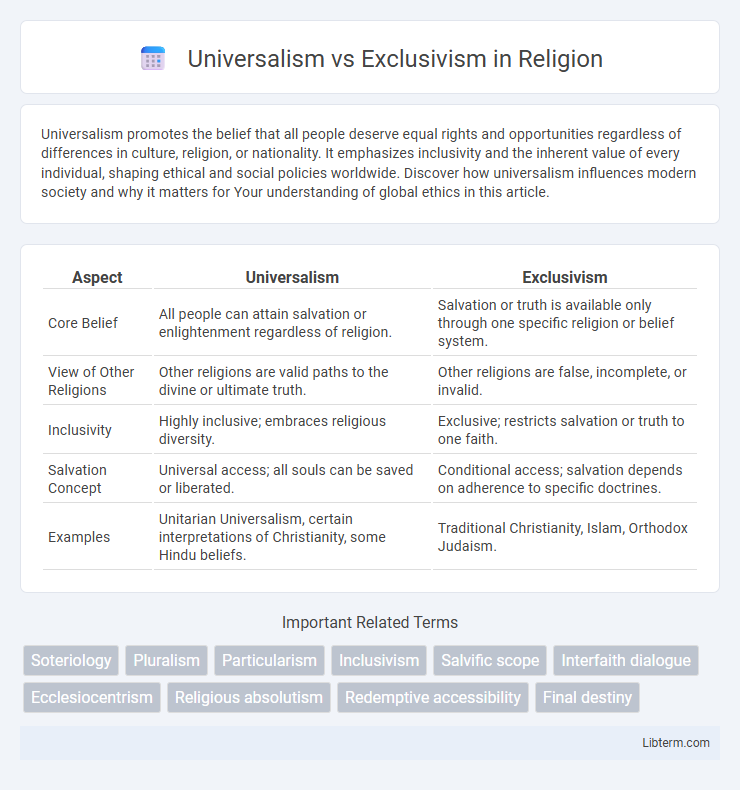Universalism promotes the belief that all people deserve equal rights and opportunities regardless of differences in culture, religion, or nationality. It emphasizes inclusivity and the inherent value of every individual, shaping ethical and social policies worldwide. Discover how universalism influences modern society and why it matters for Your understanding of global ethics in this article.
Table of Comparison
| Aspect | Universalism | Exclusivism |
|---|---|---|
| Core Belief | All people can attain salvation or enlightenment regardless of religion. | Salvation or truth is available only through one specific religion or belief system. |
| View of Other Religions | Other religions are valid paths to the divine or ultimate truth. | Other religions are false, incomplete, or invalid. |
| Inclusivity | Highly inclusive; embraces religious diversity. | Exclusive; restricts salvation or truth to one faith. |
| Salvation Concept | Universal access; all souls can be saved or liberated. | Conditional access; salvation depends on adherence to specific doctrines. |
| Examples | Unitarian Universalism, certain interpretations of Christianity, some Hindu beliefs. | Traditional Christianity, Islam, Orthodox Judaism. |
Introduction to Universalism and Exclusivism
Universalism asserts that salvation or truth is accessible to all individuals regardless of religious affiliation, emphasizing an inclusive and all-encompassing approach to spirituality and morality. Exclusivism maintains that only one particular faith or belief system holds the absolute truth, and salvation is attainable solely through adherence to that specific doctrine. These contrasting perspectives shape theological debates, interfaith dialogues, and the understanding of religious pluralism in contemporary society.
Defining Universalism: Core Beliefs and Principles
Universalism posits that all human beings share a common destiny, emphasizing inclusivity and the inherent worth of every individual regardless of cultural, religious, or social differences. Core beliefs include the idea that salvation or moral enlightenment is universally accessible, transcending specific doctrines or traditions. This principle promotes ethical behavior and social justice by advocating for equality and the dismantling of exclusive boundaries that limit human connection.
Understanding Exclusivism: Key Concepts and Tenets
Exclusivism asserts that salvation or ultimate truth is attainable only through a specific religion, often emphasizing the unique authority of sacred texts and doctrines. Central tenets include the belief in the exclusive validity of one faith tradition, rejection of pluralistic interpretations, and the assertion that non-adherents face spiritual exclusion or condemnation. This perspective shapes theological discourse on salvation, interfaith relations, and the nature of divine revelation.
Historical Context: Development of Both Doctrines
Universalism and Exclusivism emerged from divergent theological interpretations during early Christian history, with Universalism advocating salvation for all humanity based on divine love and grace, while Exclusivism emphasized salvation exclusively through explicit faith in Christ. The development of Universalism gained momentum during the Enlightenment, influenced by a growing emphasis on human reason, moral progress, and the inclusivity of divine mercy. Exclusivism solidified during the Reformation era, where doctrinal clarity and scriptural authority were prioritized, reinforcing the necessity of personal faith and doctrinal conformity for salvation.
Universalism in World Religions
Universalism in world religions emphasizes the belief that salvation or enlightenment is accessible to all individuals regardless of their faith or cultural background, embodying a more inclusive spiritual perspective. Key examples include Christianity's concept of universal salvation and the Buddhist principle of compassion extending to all sentient beings. This approach contrasts with exclusivism, which asserts that salvation or ultimate truth is confined to a single religious tradition.
Exclusivism in Religious Traditions
Exclusivism in religious traditions asserts that salvation or ultimate truth is attainable only through a specific faith or doctrine, often emphasizing the uniqueness and superiority of its beliefs. This perspective is prominent in various branches of Christianity, Islam, and Judaism, where adherence to particular rituals, scriptures, or divine revelations is deemed essential for spiritual fulfillment. Exclusivism often shapes interfaith dynamics by delineating clear boundaries between believers and non-believers, impacting theological interpretations and communal identities.
Philosophical Arguments: Universalism vs Exclusivism
Philosophical arguments for Universalism emphasize the inherent value of all human beings and the possibility of salvation or truth across diverse belief systems, promoting inclusivity and moral equality. Exclusivism, by contrast, asserts that truth or salvation is confined to a specific doctrine or faith, claiming epistemic certainty and prioritizing doctrinal purity over pluralism. Key debates revolve around the nature of truth, the problem of religious diversity, and the implications for ethics and community belonging.
Ethical Implications and Societal Impact
Universalism promotes ethical inclusivity by asserting that moral principles apply to all individuals regardless of cultural or religious backgrounds, fostering social cohesion and mutual respect. Exclusivism, emphasizing the superiority of specific beliefs or values, often leads to social fragmentation and ethical conflicts by marginalizing alternative perspectives. The societal impact of universalism tends toward integration and multicultural tolerance, while exclusivism can result in division and decreased social harmony.
Interfaith Dialogue and Modern Perspectives
Universalism advocates the inherent validity and potential salvation within all religious traditions, promoting inclusivity in interfaith dialogue through mutual respect and shared ethical values. Exclusivism maintains that only one faith holds the absolute truth, often limiting dialogue to conversion efforts or theological debate, which can create barriers to understanding in a pluralistic society. Modern perspectives increasingly favor a pluralistic approach, blending universalist respect for diverse beliefs with a nuanced recognition of doctrinal uniqueness, fostering more productive and empathetic interfaith exchanges.
Conclusion: Bridging the Divide
Universalism and Exclusivism represent contrasting theological perspectives regarding salvation and truth, yet emerging dialogues emphasize common ethical principles and shared human dignity as foundational bridges. Emphasizing mutual respect while acknowledging doctrinal differences fosters a more inclusive discourse that encourages coexistence and cooperation. This approach leverages the strengths of both views to promote harmony without compromising core beliefs.
Universalism Infographic

 libterm.com
libterm.com